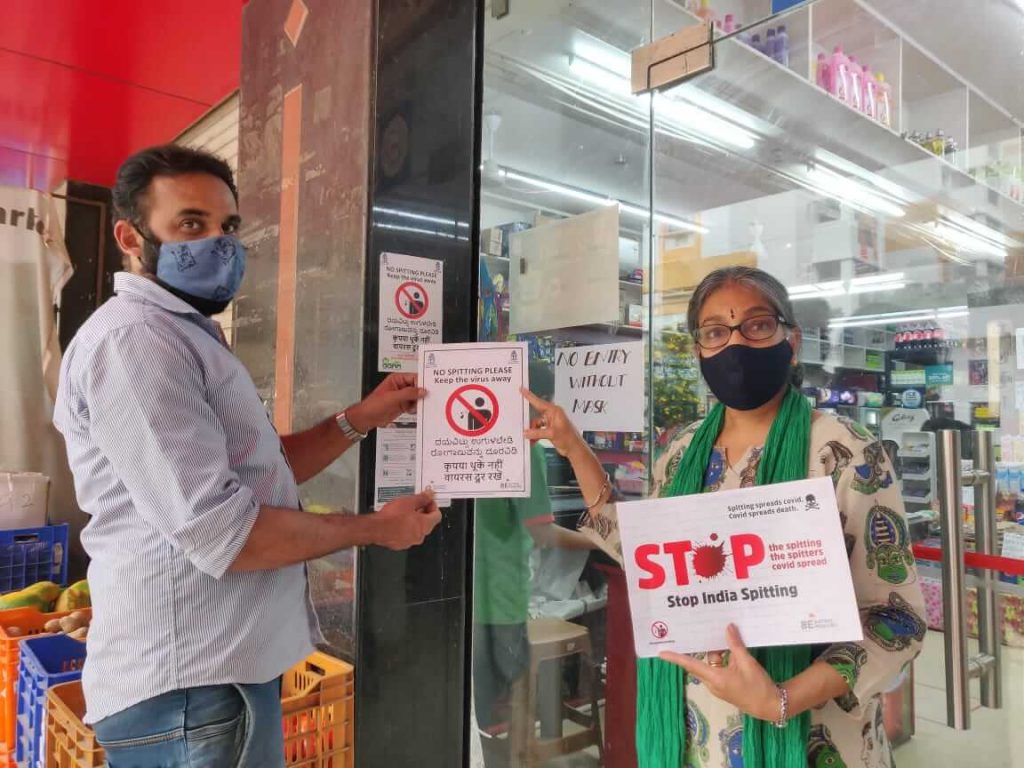
By Aratrika Dey
This pandemic saw the championing of the Stop India Spitting campaign, a national movement led by the citizens of Beautiful Bengaluru (also known as Beautiful Bharat nationwide). Established in 2015 and spearheaded by Bellandur resident Odette Katrak, a behaviour change professional, writer and changemaker, Beautiful Bengaluru is a voluntary citizens’ initiative working towards cleaner, greener, and safer cities. The campaign was instrumental in highlighting the issue nationally, resulting in the enactment of a law against spitting across India, and also ensured that the subject figured in the PM’s national address.
Local goes national
What started as a Bengaluru-centric campaign became a national movement. Driven by Odette who has now connected with over twenty-five partners across the country, ‘The Alliance to Stop India Spitting’ has seen the spontaneous coming together of groups from many states who want to end spitting in public places.
The campaign aims to stop the unsightly and unhygienic practice of spitting that is not only ruining the aesthetic of public places but also crucially timed as it is aiding in the faster spread of COVID-19. Odette has a team of like-minded individuals who are ensuring the campaign’s success by keeping the subject alive in many ways, including the constant creation of posters and videos. This month, the campaign features Gurgaon student Ahana Sur’s animated video addressing the issue that will be understandable by the illiterate. The theme, conceived by Odette, revolves around a simple scenario – if there are four windows in a room and you happen to leave one open while closing the rest to keep the mosquitoes out, it is useless.
Similarly, if you are wearing a mask, washing your hands, sanitizing, and following social distancing norms but, when outside, you are moving your mask aside and spitting, the prescribed safety precautions are of no use. This analogy reflects the essence of the video: to make habitual spitters understand that wearing a mask cannot keep them safe if they continue to spit. The video will be available in several languages to make it more understandable and educational for people across the nation. “Across the country, there are quite a few NGOs who have been working with the campaign focusing solely on the slums, who are waiting for the video to be circulated,” says Odette.
The message
The campaign serves to relay two specific messages. First, to the people who spit about why spitting is harmful. Second, to those who do not spit, so that they can educate the ignorant. Oftentimes, people turn a blind eye to this disgusting practice, which only serves to further the circle of ignorance. The ‘Stop India Spitting’ campaign was named deliberately to urge every citizen to take the initiative, including the people who do not spit. Spitting spreads COVID, so spitting must stop.
The genesis of the idea
“A window in my house overlooks a dead-end beyond which is a slum,” explains Odette. “In early March, if I were to wash my hands ten times in an hour, I would see five different people spitting outside. People were being asked to wear masks, wash their hands regularly, and sanitize. But there was no mention of spitting. I immediately shared my concern with my fellow green thinkers at Beautiful Bengaluru and we decided to take charge.”
The stages of the campaign
The campaign plan comprises three stages. The first stage during March-April 2020, was to put the movement in motion, and get the issue on the national radar. On March 16th, 2020, Beautiful Bengaluru filed a petition, ‘Restrict Coronavirus – Make SPITTING Punishable’, to the Prime Minister and followed it up with tweets, emails, and messages to the PMO (Prime Minister’s Office). The initial objective to make spitting a national offense was powered by regular reminders on social media, which was then taken up by the media to increase awareness.
The first victory came on April 15th, 2020. Spitting in public places was made punishable by the Ministry of Home Affairs (MHA), and ‘paan’ and ‘gutka’ was banned as part of national directives for COVID-19 management. The second victory came when the issue was addressed by PM Modi in his 26th April Mann Ki Baat address, which was the campaign’s second ask in the Open Letter to him.
In the second stage starting May 2020, a national survey was conducted, and the focus shifted from enforcement to awareness building. Still underway, the second stage is shifting focus to the need of the hour through easily readable signs, in a large selection of languages. Partnerships have been forged with RWAs (Resident Welfare Associations), NGOs, community groups, changemakers, and people who agree that spitting must stop and want to be a part of this movement. The team has brainstormed and reached out to like-minded individuals who have helped create an assembly of resources such as signs, posters, cartoons, and videos to equip those wanting to drive change.
Collaborating with citizens
“We came across two brilliant Bengali cartoonists, Uday Deb and Argha Manna,” says Odette. “Uday has done some extraordinary work and Argha has drawn a twenty-page illustration showing what happens when a droplet leaves the mouth – based on research from the Massachusetts Institute of Technology.” Similarly, partnerships with several other artists have been formed to create sticky content against spitting in public spaces.
Webinars for national networking
Odette has also been doing regular webinars, educating socially responsible youth about what they can do when they see someone spitting and how they can bring about the change. Online sessions for schools also aim to tell children that they can also have a pre-emptive conversation with people they know, such as maids, gardeners, cooks, drivers or even relatives and neighbours who may spit.
The third stage of the campaign to commence later in 2021, revolves around getting local champions to drive the movement, and garnering more media attention. The end goal is to erase the culture of spitting through self-discipline, so that there is no need for enforcement and punishment.
Big victories
The campaign has seen other victories within the state itself. Support from eminent influencers like Dr Devi Prasad Shetty, city police commissioner Kamal Pant, and Kannada film actor Puneeth Rajkumar have increased visibility. Many more organisations are becoming part of the campaign. Early in April, Odette noticed that the staff at a local shop would constantly step out of the shop, remove their mask, spit and then put it back on again. She explained the consequences of their actions, and stuck a precautionary poster outside the shop. A week later, the shopkeeper told her that his boys were now using the bathroom. Besides, anybody visiting the shop is also made aware of spitting in public places. Hundreds of posters have come up across Bengaluru and many other cities. The BB changemakers are reporting a reduction in spitting both through individual conversations or drives that involve sticking A4 printed sheets.
The volunteers of Beautiful Bengaluru also look to the people who are an important part of their lives, the BBMP pourakarmikas who sweep our streets. During Diwali last year, Odette and her community reached out to them and distributed sweets. Suddenly, one of the workers removed their mask and spat on the road. “It was the perfect incident-based example to instantly teach them that spitting is going to make COVID-19 spread faster.” Last week, Odette met them to share sweets for Christmas. This time around, all the workers pledged to stop spitting and also volunteered to educate others who do. Besides, the campaign was also endorsed by the Kempegowda International Airport. While traveling, the huge signs of Stop India Spitting in blue are visible around the airport. Similarly, people from Kenya were inspired by this campaign after attending Odette’s webinar, and have begun a similar movement against spitting in their country called StopKenyaSpitting!
How can you join the movement?
Beautiful Bengaluru’s work is entirely voluntary. Any individual can be part of this movement, get involved by simply explaining that spitting poses harm and it must stop. Posters, videos, influencer messages, and checklists are accessible to all. You can download, print, and put up stuff you like in your chosen area or location. You can also choose the language in which the sign is printed, from the selection of languages. New ideas are always welcome, if you were to create content for the campaign, they will be shared across the country. Or you could have an awareness drive in your groups. Just connect to them by email (stopindiaspitting@gmail.com) and join the movement that could finally be a turning point against spitting in India.



